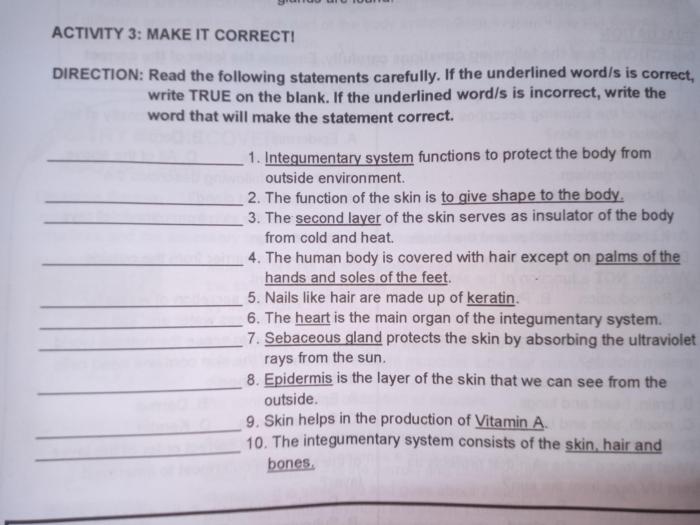Which of the following statements about asthma is correct? Asthma is a chronic respiratory disease that affects the airways and causes difficulty breathing. It is a common condition that affects people of all ages, and it can range from mild to severe.
There are many different types of asthma, and the symptoms can vary from person to person.
In this article, we will discuss the different types of asthma, the symptoms, and the treatments. We will also provide tips on how to manage asthma and prevent flare-ups.
Asthma Definitions and Characteristics

Asthma is a chronic inflammatory disease of the airways characterized by recurrent episodes of wheezing, coughing, chest tightness, and shortness of breath. It is caused by an overreaction of the immune system to certain triggers, leading to airway inflammation and narrowing.
Key Characteristics and Symptoms
* Wheezing: A whistling sound during breathing caused by narrowed airways.
Coughing
Persistent and unproductive cough, often triggered by exercise or cold air.
Chest tightness
A feeling of pressure or discomfort in the chest.
Shortness of breath
Difficulty breathing, especially during exertion.
Underlying Mechanisms and Causes
* Allergic asthma: Triggered by allergens such as pollen, dust mites, and pet dander.
Non-allergic asthma
Triggered by non-allergic factors such as exercise, cold air, and smoke.
Occupational asthma
Triggered by workplace irritants such as chemicals, fumes, and dust.
Types of Asthma
Allergic Asthma
* Triggered by allergens such as pollen, dust mites, and pet dander.
- Symptoms typically worsen during allergy season or exposure to allergens.
- Common in children and young adults.
Non-Allergic Asthma
* Triggered by non-allergic factors such as exercise, cold air, and smoke.
- Symptoms can occur at any time, regardless of allergen exposure.
- More common in adults than children.
Occupational Asthma
* Triggered by workplace irritants such as chemicals, fumes, and dust.
- Symptoms typically develop after exposure to the irritant at work.
- Can affect individuals of any age.
Diagnosis and Treatment of Asthma

Diagnostic Procedures
* Physical exam: To assess symptoms, lung function, and overall health.
Lung function tests
To measure airflow and lung capacity.
Allergy testing
To identify potential allergens.
Treatment Options
* Medications: Inhalers and oral medications to reduce inflammation and open airways.
Lifestyle modifications
Avoiding triggers, exercising regularly, and managing stress.
Immunotherapy
Injections or tablets that desensitize the immune system to allergens.
Importance of Regular Monitoring and Follow-Up Care
* Regular monitoring helps track symptoms and adjust treatment plans.
Follow-up care ensures proper medication adherence and lifestyle management.
Asthma Management and Prevention

Practical Tips for Managing Symptoms
* Use inhalers as prescribed.
- Avoid known triggers.
- Exercise regularly.
- Manage stress.
- Get adequate sleep.
Role of Lifestyle Factors
* Exercise: Regular physical activity can improve lung function and reduce symptoms.
Diet
Eating a healthy diet can support overall health and reduce inflammation.
Stress management
Stress can trigger asthma symptoms, so managing stress is crucial.
Importance of Avoiding Triggers and Developing an Asthma Action Plan, Which of the following statements about asthma is correct
* Identifying and avoiding triggers is essential for effective asthma management.
An asthma action plan provides clear instructions on how to manage symptoms and prevent attacks.
Asthma and Related Conditions

Potential Links to Other Respiratory Conditions
* Chronic obstructive pulmonary disease (COPD): Asthma and COPD share similar symptoms, but they have different underlying causes and treatments.
Allergic rhinitis
Also known as hay fever, it is an inflammation of the nasal passages caused by allergens.
Impact on Overall Health and Quality of Life
* Asthma can affect daily activities, sleep, and overall well-being.
It can lead to missed work or school, reduced exercise tolerance, and social isolation.
Importance of Seeking Professional Medical Advice
* It is crucial to seek professional medical advice for asthma-related concerns.
Proper diagnosis and treatment can help manage symptoms and improve quality of life.
FAQ Summary: Which Of The Following Statements About Asthma Is Correct
What are the symptoms of asthma?
The symptoms of asthma can vary from person to person, but they may include wheezing, coughing, chest tightness, and shortness of breath.
What are the different types of asthma?
There are many different types of asthma, including allergic asthma, non-allergic asthma, and occupational asthma.
How is asthma treated?
Asthma is treated with a variety of medications, including inhaled corticosteroids, bronchodilators, and leukotriene modifiers.
How can I prevent asthma flare-ups?
There are a number of things you can do to prevent asthma flare-ups, including avoiding triggers, taking your medications as prescribed, and getting regular checkups.